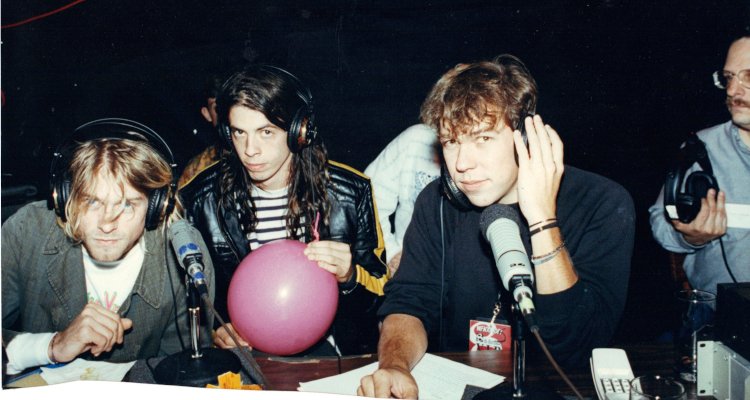
Nirvana’s Kurt Kobain (left) and Dave Grohl (right) during a 1991 radio interview. Photo Credit: Julie Kramer
The much-publicized child-pornography lawsuit filed against Nirvana by Spencer Elden, the now-adult individual who appeared on the cover of Nevermind (1991) as a baby, has officially been dismissed with prejudice.
Elden filed the shocking complaint against Universal Music Group, the estate of Kurt Cobain, the surviving members of Nirvana, Kirk Weddle (who photographed the iconic Nevermind cover image), and others back in August of 2021.
30 years old at the time of the suit’s submission, Elden maintained that the defendants had “knowingly produced, possessed, and advertised commercial child pornography” with the decades-old album’s cover, besides alleging that they had “knowingly received value in exchange for doing so.”
Additionally, the plaintiff stated that he’d suffered “permanent harm” as a result of his appearance on the cover of Nevermind (which has sold north of 30 million copies to date and received several 30th anniversary edition releases, complete with the original cover, despite the legal battle), including but not limited to a “lifelong loss of income earning capacity.”
On the heels of multiple delays and unexpected twists – the arrival of an “intervenor defendant” among them – Elden submitted an amended action that, while substantially similar to the original suit, placed a greater emphasis upon Kurt Cobain’s alleged role in selecting the Nevermind cover.
UMG, Nirvana, and the other defendants promptly fired back, writing in a motion for dismissal: “Elden has spent three decades profiting from his celebrity as the self-anointed ‘Nirvana Baby. He has reenacted the photograph in exchange for a fee, many times; he has had the album title ‘Nevermind’ tattooed across his chest; he has appeared on a talk show wearing a self-parodying, nude-colored onesie; he has autographed copies of the album cover for sale on eBay; and he has used the connection to try to pick up women.”
This motion for dismissal brought about the desired result (for the defendants, of course) towards 2022’s beginning, when Judge Fernando M. Olguin dismissed the suit and indicated that he would provide Elden with “one last opportunity to amend his complaint.”
Predictably, the refiled action made its way to the court shortly thereafter, but as mentioned at the outset, the same judge has once again dismissed the complaint from Spencer Elden, this time with prejudice.
The associated dismissal notice was just recently filed, and neither Spencer Elden nor his counsel looks to have publicly addressed the development. (A number of fans are weighing in on the subject with comments on Elden’s seldom-used Instagram account, though.)
Upon dismissing the action the first time around, Judge Olguin called on Elden to “carefully evaluate the contentions set forth” by the defendants, including that several of the claims were barred by a statute of limitations. And in explaining this final dismissal, the presiding judge noted the lengthy window separating the album cover’s photo shoot and the lawsuit’s filing.

